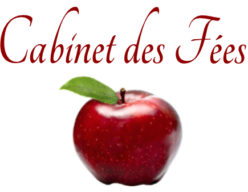
by Caroline C. Duda
![]()
When the last of the March snows melt, scrub street salt from the shop windows, until the painted script of FOXGLOVE BAKERY gleams once more.
Wash the winter’s grit from the floors. Mix a weak solution of vinegar and water; it is a new account Callahan & Sons desires’”not the health of our hardwood.
Heat the oven as the rising sun gilds the thatched roofs of village cottages. Line two cake pans with parchment while its carbon coils gather their orange glow.
Push a damp rag between the register’s keys. Clean the pastel streaks of frosting from their embossed faces and tapered bronze legs. While you may call the machine old, it is serviceable and too precious to part with.
Polish icing fingerprints and spots of jellied filling from the glass-topped café tables. Buff the curls of wrought iron, the graceful arches and blooms of ivy.
Slide the smooth edge of a paring knife beneath the stamped seal of a bag of cocoa. Dust each pan with just a pinch’”the chocolatier grinds these beans but once a month.
During the first weeks of spring, till the strip of arable land to the bakery’s south. Scatter cupped palmfuls of flax seed along its narrow length.
Purchase only those Friesian calves born of a broad black bull.
Sift flour gathered from a western field until it is light and free of lumps. Sweeten it with sugar. Measure teaspoons of baking powder, baking soda, coarse salt. Dip a whisk in linseed oil. Mix well.
Allow Mr. Pearsal no more than two Affection petit fours. Should he choose to eat them in the shop’”and he will, if the ladies from the home are present’”watch his hands.
Identify those who seek Courage by the pink tongues that wet bitten lips, the restless fingers that dance along the worn marble counters. Offer a lemon tart, for they will not request it themselves.
To this mixture, add the milk while it is still warm and froths in the pail.
Do not chase the village children from the tall fields of ripening flax. Their laughter, if they dash between the plants’ blue, bobbing heads, will leaven your cakes.
Fill the water troughs with the unsettled, open sea. Its bitterness will curdle the cows’ milk, release stifled tears.
Then draw hot water from the groaning tap.
Bake double the Delight meringues you expect to sell. Housewives, school children, whole villages will clamor for the burst of ripe strawberry, the frenzy of sweetness upon their dulled palate.
Refrain from serving Serenity to customers who sit in the café. They will savor each morsel with loose limbs and remain long after evening approaches.
Crack three large eggs. Tip their quivering orange yolks into a shallow dish, then pick free the shards of speckled shell you so often overlook.
When the star-shaped flax pods sit brown and split upon their stalks, pluck them free. Pry the seeds from their tough casings.
Milk our little coterie of cows by hand. Saracen’s Dairy Parlor will swindle you and sour the milk to boot.
Fling the shop’s glazed windows wide. Do not shut them while the batter bakes’”the mingling scents of vanilla and ground cocoa, salt tossed high by late-autumn sea storms, will draw those most in need.
Press those flax seeds with creamy, unbroken husks upon a stone round. Store in a cool pantry, safe from the sunlight that turns their delicate, yellow oils.
When you put the cows to pasture, lead dear old Mercy along the clover-cushioned back path. Think of her tender hooves, not the boy you must hurry to meet.
Finally, pack Comfort tight in a plain white pastry box. Pray you never pick at its clear, circular sticker with trembling fingers, nor lift its top free.
Caroline C. Duda is a Chicago resident and a graduate of the MFA program at the University of Illinois at Urbana-Champaign. She has previously been published in The Abacot Journal.
